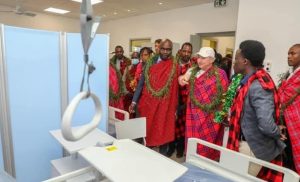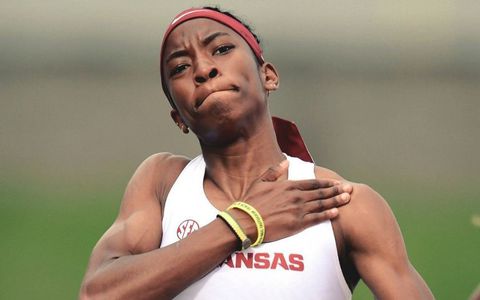Agnes Tirop is a true definition of a star that never got to shine, having her life cut short by someone she trusted and loved.
The late Agnes Jebet Tirop was more than just a runner, she was a symbol of hope, perseverance, and excellence in the world of athletics.
As a young girl, Agnes Tirop showed exceptional talent, rising through the ranks to become one of Kenya’s brightest long-distance running stars.
However, in a tragic turn of events, her life was cut short in 2021, not by injury or illness, but by gender-based violence (GBV).
Felix, who has been very vocal over maternal welfare amongst female athletes, has revealed how to abate domestic violence subjected to them following Rebecca Cheptegei’s unfortunate demise last September.
Her death was not only a heartbreaking loss for her family, friends, and fans but also a glaring reminder of the silent battles many female athletes face behind closed doors.
Agnes Tirop’s murder highlighted a global issue that often goes unnoticed—how toxic relationships, domestic violence, and a lack of support systems continue to hold back some of the world’s most talented sportswomen.
Other women who have suffered in the hands of those they trusted include Rebecca Cheptegei, Damaris Muthee Mutua and Edith Muthoni.
Agnes Tirop:The rise of a champion
)
Agnes Jebet Tirop, Kenya, wins the womens 5000m during Thursdays Diamond League competitions in athletics at Stockholm Stadium. Image source: Imago
Agnes Tirop was born on October 23, 1995, in Uasin Gishu County, and from her birth, it was evident that she was destined for greatness.
Agnes Tirop first gained global recognition in 2012 when she won a bronze medal at the World Junior Championships in the 5000m, setting the stage for a remarkable career.
Her dominance in long-distance running only grew stronger with time and in 2015, at just 19 years old, Agnes Tirop won the World Cross Country Championships, becoming the second-youngest woman in history to claim the title.
She later went on to secure a bronze medal in the 10,000m at the 2017 World Championships and finished fourth in the same event at the Tokyo 2020 Olympics.
One of her most memorable performances was in September 2021, after the Olympic Games when she shattered the women-only 10km world record, clocking an astonishing 30:01. However, the world would never get to see her full potential.
Agnes Tirop: A tragic and preventable end
)
Agnes Jebet Tirop of Kenya celebrates after winning the women s 5000m during Bauhaus galan on May 30, 2019. Image source: Imago
On October 13, 2021, news broke that Agnes Tirop had been found dead in her home in Iten, Kenya, with multiple stab wounds to her neck and abdomen with the prime suspect her husband, Ibrahim Rotich.
Multiple reports revealed that Agnes Tirop had been a victim of an abusive marriage that she was trying to escape.
Just days before her murder, she had moved to a training camp, hoping to restart her life away from the toxic relationship but sadly her decision to leave came too late.
Her death sent shockwaves through the world of athletics. How could a woman so strong, so independent, and so successful be a victim of gender-based violence?
Truth is, domestic violence knows no boundaries and it affects women across all professions, ages, and social classes.
A pattern of violence against female athletes
)
Agnes Jebet Tirop winner of the Women s 3000m during the Muller Grand Prix IAAF Diamond League meeting at Alexander Stadium, Perry Barr, Birmingham. Image source: Imago
Agnes Tirop’s story is tragically familiar since she was not the first female athlete to be lost to gender-based violence, and, devastatingly, she was not the last.
In 2021, rising Kenyan runner Edith Muthoni was also killed by her partner. In 2024, marathoner Rebecca Cheptegei was doused in petrol by her ex-companion in Kenya.
Such horrifying cases highlight a disturbing pattern of female athletes, despite their strength and success, being forced to remain vulnerable to intimate partner violence.
)
Quincy Wilson has been making headlines for his record-breaking speed and rising career, while his relationship with Masai Russell’s younger sister adding intrigue to his journey.
One of the biggest challenges is that many of these women enter relationships at a young age with older men who assume control over their careers and finances.
In Agnes Tirop’s case, her relationship with Rotich began when she was still in high school, while he was 16 years her senior. This imbalance of power often leads to manipulation, isolation, and, in extreme cases, violence.
The birth of Tirop’s Angels: Fighting GBV in sports
Following Agnes Tirop’s tragic death, her family, friends, and fellow athletes vowed to ensure that her suffering was not in vain leading to the formation of Tirop’s Angels, an organisation dedicated to combating gender-based violence in sports.
The organisation works to educate young athletes about the warning signs of abusive relationships, providing them with resources to seek help.
They have also partnered with male athletes to challenge the deep-rooted cultural beliefs that enable GBV to thrive.
Awareness campaigns, community outreach programs, and training sessions are being held across Kenya, emphasizing that no athlete should have to choose between success and safety.
The global fight against GBV in athletics
)
Agnes Jebet TIROP (KEN) celebrates taking third place in the womens 10,000m during the London 2017 IAAF World Athletic Championship at Queen Elizabeth Olympic Park, London, United Kingdom. Image source: Imago
While Tirop’s case drew attention to the issue in Kenya, gender-based violence in sports is a worldwide crisis.
Female athletes from all corners of the globe face harassment, abuse, and discrimination often from those that they trust the most, including coaches, partners, and team officials.
International sports organisations have a responsibility to do more. Policies must be put in place to ensure athletes have safe reporting mechanisms, legal protection, and immediate access to support services. Without these measures, we risk losing more women to preventable tragedies.
The future: Protecting the next generation
Agnes Tirop’s murder was a wake-up call. She was not just a statistic or another tragic story—she was a world-class athlete whose life was stolen before she could reach her full potential.
Moving forward, the sports community must take concrete steps to protect female athletes from gender-based violence.
Agnes Tirop’s story should never be forgotten since she was a symbol of resilience, a young woman who had the world at her feet, only for it to be taken away too soon.
Her name must continue to be spoken, not just in mourning but as a call to action. The best way to honour her legacy is by ensuring that no other athlete has to suffer the same fate.
As the fight against gender-based violence continues, one message must be loud and clear: No medal, no record, no championship is worth a life. Women in sports deserve to be safe on and off the track.







)



